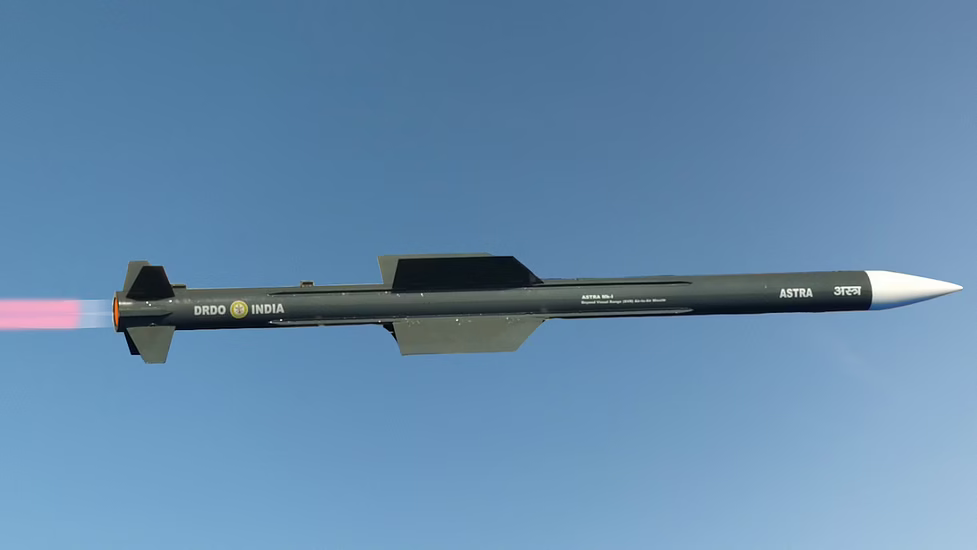Important Facts For Prelims
Astra Mk-1 Missile
- 01 Jun 2022
- 5 min read
Why in New?
Recently, the Ministry of Defence has signed a contract with the Hyderabad-based public-sector Bharat Dynamics Ltd (BDL) for supply of the Astra Mark-1.
- Contract was signed at a cost of Rs 2,971 crore, for deployment on fighter jets of the Indian Air Force and Indian Navy.
What are the Astra Missile and its Variants?
- The Astra project was officially launched in the early 2000s with defined parameters and proposed future variants.
- Around 2017, the development phase of the Mk-1 version was complete.
- Several successful tests have been conducted since 2017 from Sukhoi-30 MKIs.
What are the Key Highlights of the Astra Mk-1 Missile?
- About:
- The Astra Mk-1 is a Beyond Visual Range (BVR), Air-to-Air Missile (AAM).
- BVM missiles are capable of engaging beyond the range of 20 nautical miles or 37 kilometers.
- AAMs are fired from an airborne asset to destroy an airborne target.
- The Astra Mk-1 is a Beyond Visual Range (BVR), Air-to-Air Missile (AAM).
- Range:
- The range for Astra Mk-1 is around 110 km.
- The Mk-2 with a range over 150 km is under development and Mk-3 version with a longer range is being envisaged.
- One more version of Astra, with a range smaller than Mk-1 is also under development.
- Designed and Developed by:
What is the Strategic Significance?
- Reduce Dependency on Foreign Sources:
- The missile has been designed based on requirements specified by the Indian Air Force (IAF) for BVR as well as close-combat engagement, reducing the dependency on foreign sources.
- AAMs with BVR capability provides large stand-off ranges to own fighter aircraft which can neutralise adversary airborne assets without exposing themselves to adversary air defence measures.
- Stand-off range means the missile is launched at a distance sufficient to allow the attacking side to evade defensive fire from the target.
- The missile has been designed based on requirements specified by the Indian Air Force (IAF) for BVR as well as close-combat engagement, reducing the dependency on foreign sources.
- Technologically and Economically Superior:
- Astra is technologically and economically superior to many such imported missile systems.
- The missile can travel at speeds more than four times that of sound and can reach a maximum altitude of 20 km, making it extremely flexible for air combat.
- Can be Integrated with other Fighter Aircraft:
- The missile is fully integrated on the Sukhoi 30 MKI I and will be integrated with other fighter aircraft in a phased manner, including the Light Combat Aircraft (LCA) Tejas.
- It will integrate the missile on the MiG-29K fighter aircraft which are deployed on the Navy’s aircraft carriers, thus adding to the lethality of India’s Aircraft carriers.
UPSC Civil Services Examination, Previous Year Question
Q. With reference to Agni-IV Missile, which of the following statements is/are correct? (2014)
- It is a surface-to-surface missile.
- It is fuelled by liquid propellant only.
- It can deliver one-tonne nuclear warheads about 7500 km away.
Select the correct answer using the code given below:
(a) 1 only
(b) 2 and 3 only
(c) 1 and 3 only
(d) 1, 2 and 3
Ans: (a)
Exp:
- Agni-IV is a nuclear-capable long-range ballistic missile of India, with a strike range of 4,000 km.
- The indigenously developed Agni-IV is a two-stage surface-to-surface missile. It is 20 metres long with a weight of 17 tonnes. Hence, statement 1 is correct.
- It is a two stage solid fuelled system that can carry a one-tonne nuclear warhead over a distance of 4,000 kilometres. Hence, statements 2 and 3 are not correct. Therefore, option (a) is the correct answer.
Q. In the context of Indian defence, consider the following statements: (2009)
- The Shourya missile flies with a speed of more than 8 Mach.
- The range of Shourya missile is more than 1600 km.
Which of the statements given above is/are correct?
(a) 1 only
(b) 2 only
(c) Both 1 and 2
(d) Neither 1 nor 2
Ans: (d)
Exp:
- Shourya is a hypersonic surface-to-surface tactical missile developed by the Defence Research and Development Organisation (DRDO) for use by the Indian Armed Forces.
- Its speed is Mach 7.5. Hence, statement 1 is not correct.





